"In Loving memory of his granny Ryalla Duffy" - Levi-George completes a charity mountain hike
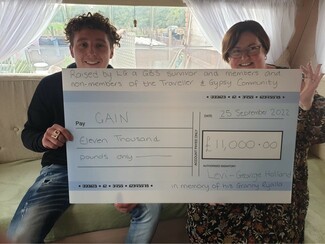
When Levi-George Holland survived a rare health condition that his granny had already died of, he decided to climb the highest mountains in the UK to raise awareness of the condition, and to raise thousands of pounds for charity.

Levi-George and his team of supporters – some from the Gypsy Traveller community and some not – successfully completed the Three Peaks Challenge in June, this year, and have now handed over the money raised to GAIN, a charity that supports people suffering from Guillain-Barré syndrome.
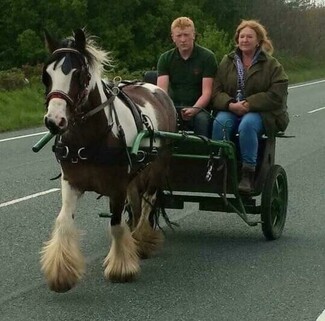
Ryalla Duffy, a well-known and respected Romany Gypsy campaigner, died from Guillain-Barré syndrome on March 10th, 2021, aged 62.
Soon after, Ryalla’s grandson Levi-was diagnosed with the same syndrome.
“My son came down with it in September last year, says Ryalla’s daughter Vee Duffy. “It’s very rare and not heard of very often to have two members of same family to get it.
“Levi-George was fully paralysed for six weeks and then began physiotherapy to get back to health,” adds Vee.
“He had a very good recovery and climbed the Three-Peak Challenge in just under 36 hours on the 17th to 19th June this year, along with 19 other members of his family and friends.”
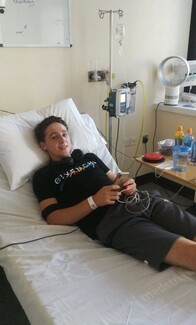
The Three Peaks Challenge involves climbing the highest three mountains in England, Scotland, and Wales – Scafell Pike in England, Ben Nevis in Scotland, and Snowden in Wales.
Vee adds that the decision to climb the mountains to raise money and awareness of Guillain-Barré syndrome was made as Levi-George lay in hospital not knowing if he would ever walk again.
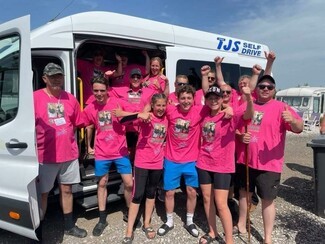
“We decided that if Levi-George does recover - we will do the Three Peaks Challenge to help raise awareness and support for other people who have been affected by the same syndrome, but who have not been as lucky as him,” says Vee.
“It was done in loving memory for his granny.”
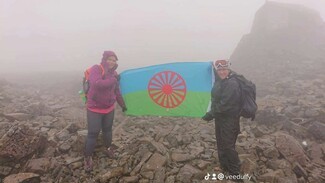
Guillain-Barré syndrome is a very rare and serious condition that affects the nerves. Health experts are not entirely sure what triggers the syndrome, but it usually happens after an infection. The condition cannot be ‘caught’ from another person like flu and other diseases can be.
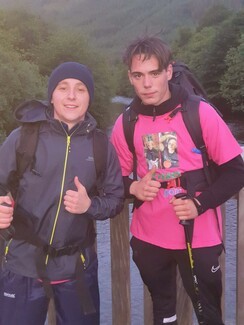
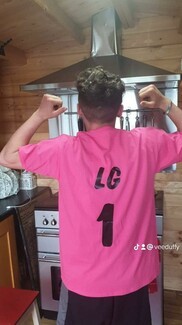
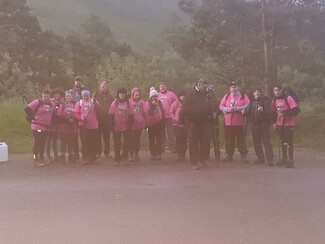
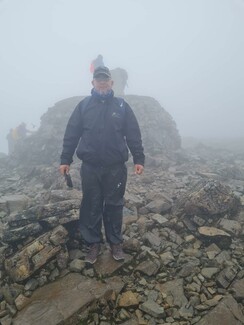
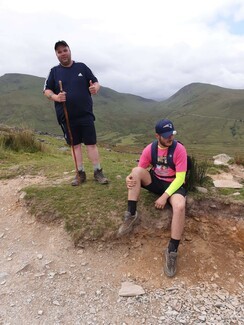
Julie Colman and Mike Doherty/TT News
(Lead picture: Levi-George Holland and Caroline Morrice, Chief Executive of GAIN. All photographs courtesy of Vee Duffy)
Vee and Levi-George are keen to raise awareness of Guillain-Barré syndrome because an early diagnosis of this life-threatening health condition is crucial, so to support their aim we have republished information from the NHS website below:
Guillain-Barré syndrome - NHS (www.nhs.uk)
Guillain-Barré (pronounced ghee-yan bar-ray) syndrome is a very rare and serious condition that affects the nerves.
It mainly affects the feet, hands and limbs, causing problems such as numbness, weakness and pain.
It can be treated and most people will eventually make a full recovery, although it can occasionally be life-threatening and some people are left with long-term problems.
Guillain-Barré syndrome affects people of all ages but it is more common in adults and males.
Symptoms of Guillain-Barré syndrome
Symptoms often start in your feet and hands before spreading to your arms and legs.
At first you may have:
- numbness
- pins and needles
- muscle weakness
- pain
- problems with balance and co-ordination
These symptoms may continue to get worse over the next few days or weeks before they start to slowly improve. In severe cases, you may have difficulty moving, walking, breathing and/or swallowing.
Read more about the symptoms of Guillain-Barré syndrome.
When to get medical help
See a GP if you notice any of the early symptoms of Guillain-Barré syndrome, such as numbness or weakness.
Call 999 for an ambulance or go to your nearest accident and emergency (A&E) department immediately if someone:
- has difficulty breathing, swallowing or speaking
- cannot move their limbs or face
This is a medical emergency and the person needs to be seen in hospital as soon as possible.
Read more about how Guillain-Barré syndrome is diagnosed.
Causes of Guillain-Barré syndrome
Guillain-Barré syndrome is thought to be caused by a problem with the immune system, the body's natural defence against illness and infection.
Normally the immune system attacks any germs that get into the body. But in people with Guillain-Barré syndrome, something goes wrong and it mistakenly attacks and damages the nerves.
It's not clear exactly why this happens, but the condition often happens after an infection; especially an infection of the airways, such as flu, or an infection of the digestive system, such as food poisoning or a stomach bug (gastroenteritis).
Read more about causes of Guillain-Barré syndrome.
Treatments for Guillain-Barré syndrome
Most people with Guillain-Barré syndrome are treated in hospital.
The main treatments are:
- intravenous immunoglobulin (IVIG) – a treatment made from donated blood that helps bring your immune system under control
- plasma exchange (plasmapheresis) – an alternative to IVIG where a machine is used to filter your blood to remove the harmful substances that are attacking your nerves
- treatments to reduce symptoms such as painkillers
- treatments to support body functions, such as a machine to help with breathing and/or a feeding tube
Most people need to stay in hospital for a few weeks to a few months.
Read more about how Guillain-Barré syndrome is treated.
Recovering from Guillain-Barré syndrome
Most people with Guillain-Barré syndrome will recover from most of their symptom within 6 to 12 months. But it can take from several months to several years to fully recovery from the nerve damages caused by Guillain-Barré syndrome.
However, around 1 in 5 people are left with long-term problems such as:
- being unable to walk without assistance
- weakness in your arms, legs or face
- numbness, pain or a tingling or burning sensation
- balance and co-ordination problems
- extreme tiredness
Therapies such as physiotherapy, occupational therapy and speech and language therapy (a speech and language therapist can help with both communication and swallowing difficulties) may help you recover and cope with any lasting difficulties.
In a minority of cases, Guillain-Barré syndrome can cause life-threatening problems such as severe breathing difficulties or blood clots. Overall, around 1 in 20 will die from Guillain-Barré syndrome.